Who we are:
- Professor Joseph Bateman, Basic and Clinical Neuroscience
- Dr Frank Hirth, Basic and Clinical Neuroscience
- Dr Manolis Fanto, Basic and Clinical Neuroscience
- Dr Alessio Vagnoni, Basic and Clinical Neuroscience
- Dr Jemeen Sreedharan, Basic and Clinical Neuroscience
- Professor Guy Tear, Department of Developmental Neurobiology
- Dr Darren Williams, Department of Developmental Neurobiology
- Dr Rita Sousa-Nunes, Department of Developmental Neurobiology
- Professor Brian Stramer, Randall Centre for Cell & Molecular Biophysics
- Dr Olga Baron, Wolfson Centre for Age-Related Diseases (Honourary lecturer)
For general information contact Joseph Bateman or click on the profiles below.
-

Professor of Molecular Neuroscience
-

Reader in Functional Genomics
-

Professor of Evolutionary Neuroscience
-

Lecturer in Developmental Neurobiology
-

Wellcome Trust Senior Research Fellow
-

Professor
-

Professor of Molecular Neurobiology
-

Senior Lecturer
-

Reader in Developmental Neurobiology
- We have fly food kitchens and technical staff for preparation of fly food, as well as dedicated space and equipment for fly maintenance and breeding.
- We utilise Drosophila models of developmental neurobiology, neurodegenerative disease and the ageing nervous system. We analyse phenotypic readouts using a range of experimental and behavioural platforms. See the relevant tabs for more details.
- King's DNN researchers support each other's research and we have established extensive national and international collaborations.
- In addition to core support from King's, we are funded through a range of governmental and charity grants and programmes.
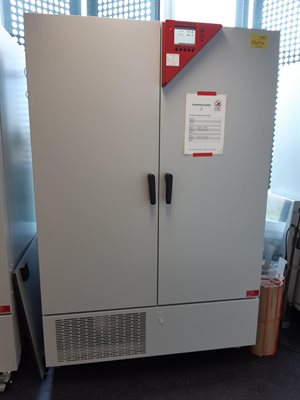
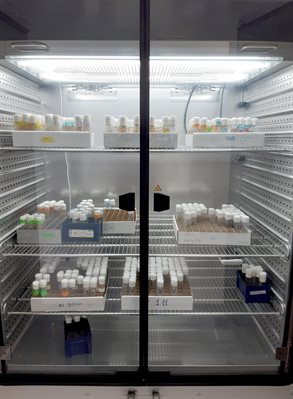
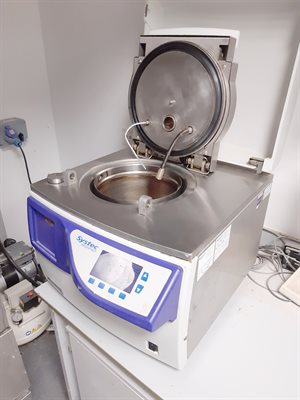
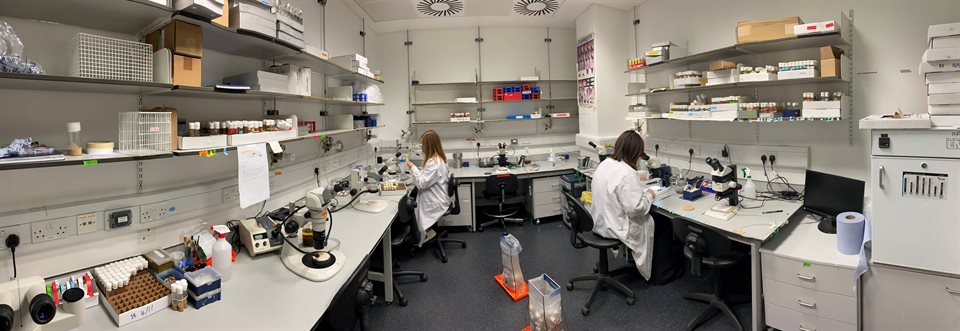
Drosophila locomotion tracking in real time
We use Any-maze (https://www.any-maze.com/), an extremely powerful animal tracking software package, developed for vertebrate models but we have optimised it for live real-time tracking of Drosophila locomotion. Up to 36 individual flies can be tracked simultaneously in real time. Quantitative analysis of average speed, total distance, positional information and many other parameters can be analysed e.g. Granat et al 2022. Bespoke tracking and analysis programs can be easily developed using the intuitive interface.

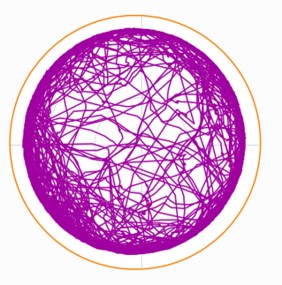
Drosophila circadian rythym and sleep analysis
We utilise TriKinetics activity monitors (https://www.trikinetics.com/), which are the most frequently used system for tracking circadian rhythm and sleep in Drosophila. The DAM5H Drosophila Activity Monitor measures the locomotor activity of 32 individual flies using 15 infrared beams per tube. We use the DAM5H for long term monitoring of Drosophila locomotion, circadian rhythm and sleep.
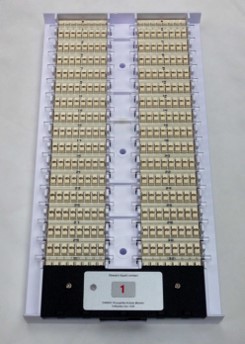
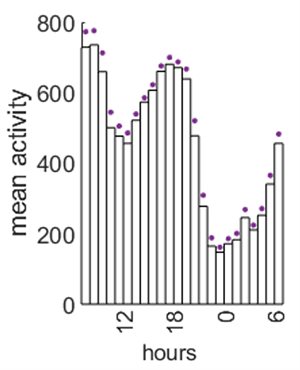
Appetite and feeding behaviour
We use the CApillary FEeder Assay (https://pubmed.ncbi.nlm.nih.gov/28362419/) to measure food intake in Drosophila. Feeding and appetite can be disrupted in a range of neurological and psychiatric disorders.
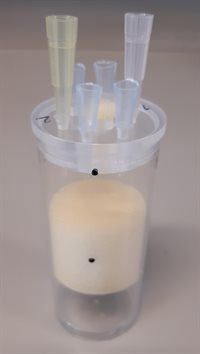
Detection of painful stimuli (nociception) using the Jump assay
Assessment of Drosophila jumping behaviour upon exposure to rising temperatures is a robust measure of injury-induced hypersensitivity to heat [https://en.bio-protocol.org/e4079]. Our automated system provides a medium through-put capability set up and enables a daily analysis of up to 300 individual flies to study conserved mechanisms important for acute and chronic pain.
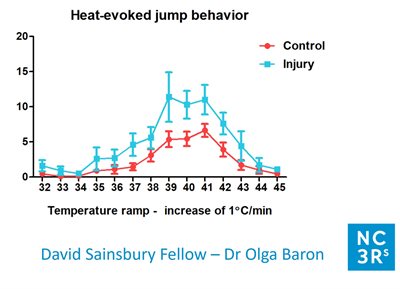
1D analysis of motor activity – vibrating platform
The Drosophila arousal tracking system (DART) software (Faville, R. et al. Sci Rep 5, 8454 (2015)) is used to track and quantify fly motor behaviour elicited by a train of vibration stimuli or endogenously generated (Mazaud, D. et al. J Neurosci 39, 5269-5283 (2019)) on a motor-controlled platform with IR illumination developed by BFK Lab Ltd (http://www.bfklab.com/).
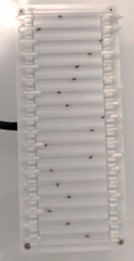
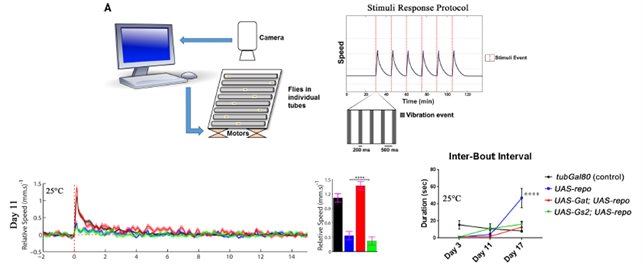
1D analysis of seizures – thermal platform
We adapted the DART software to track and quantify seizures in flies, elicited by hyperthermia. A novel hydrodynamic prototype platform has been manufactured by BFK Lab Ltd (http://www.bfklab.com/) and we have run a proof of concept analysis.
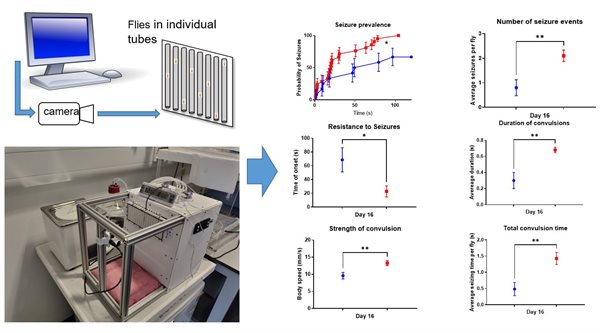
1D analysis of motor activity – optogenetic stimulation
The DART software is used to track and quantify fly motor behaviour in an bespoke optogenetic enclosure.
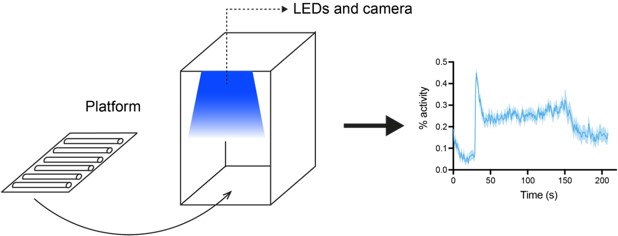
Live imaging of CNS development
We use several imaging systems that allow for timelapse-analysis of the developing CNS from various spatial and temporal scales, from whole organ imaging to super-resolution of intracellular components. Shown here is an example movie of the developing Drosophila nerve cord on a Zeiss laser scanning confocal microscope, highlighting the glia and surrounding macrophages, which are needed to help form the blood brain barrier (https://www.biorxiv.org/content/10.1101/2022.04.18.488510v1).
.
Fanto lab: Autophagy in the nervous system in health and disease
Autophagy is a fundamental housekeeping mechanism for long-lived cells like neurons. Its efficiency decays with age and can become dysfunctional either because of genetic mutations (primary autophagy defects) or because of excessive accumulation of misfolded proteins or damaged organelles (secondary autophagy defects). Using Drosophila, we study how autophagy impacts neuronal structure and function.

Bateman lab: Mitochondrial disease
Primary mitochondrial diseases are caused by mutations in genes that affect mitochondrial function. Patients have a range of symptoms affecting the nervous system and muscle. We use genetic tools to generate flies with nervous system specific mitochondrial dysfunction. Using these Drosophila models we have provided important insight into the mechanisms underlying mitochondrial disease.

Vagnoni lab: Intracellular trafficking, ageing and neurodegeneration
We are studying the cell biology of the neuron with a focus on the relationship between intracellular trafficking and neuronal function. The lab is particularly interested in studying the transport of organelles and vesicles in the axons of neurons during ageing and neurodegeneration. We routinely use live cell imaging, super resolution and light sheet microscopy of adult Drosophila neurons. Expanding the available toolkit to study cytoskeletal trafficking is also an important part of our work and we are happy to share our knowledge and our reagents as they become available.
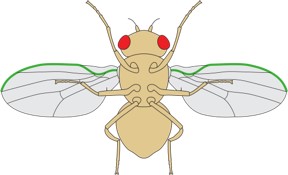
http://www.vagnonilab.com/
Baron lab: Nociception & pain mechanisms
Nociception as a mechanism of sensing noxious stimuli and escaping potential harm is widely conserved across metazoan species, including the fruit fly. We use the adult Drosophila to study molecular mechanisms that are activated in peripheral somatosensory neurons (nociceptors) upon injury – mimicking nociceptive sensitisation similar to that observed in human chronic pain conditions. Identification of molecular mechanisms (molecular markers) involved in nociceptive sensitisation facilitates the use of genetic biosensor tools for further mechanistic and pharmacological studies.
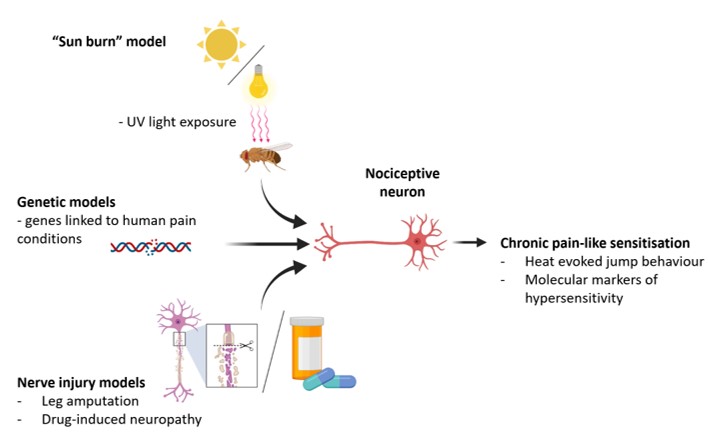
Tear lab: Drosophila as a model for neurodegenerative disease
The Tear group are using Drosophila to increase our understanding of gene products associated with Alzheimer’s and Batten disease. We use humanised Drosophila that express human tau and specific identified human kinases to create an AD-like pathology. We are beginning to discriminate the specific involvement of the different kinases alone or together in the creation of toxic forms of tau. Batten disease, also known as neuronal ceroid lipofuscinoses (NCLs), describes a group of at least nine fatal monogenetic neurodegenerative disorders that primarily affect infants and children. The genes mutated in several forms of the disorder have been identified recently, but very little is known about the precise roles of these gene products. We investigate the role of the transmembrane proteins Cln7 and Cln3, which are affected in the most common forms of NCL. Drosophila Cln3 shares many properties with the vertebrate form, it is localised to the endosomal-lysosomal compartment in many cell type and found at the synapse. We are investigating the roles these proteins play in the normal function and development of the neuromuscular junction.
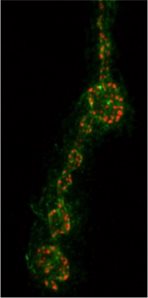
Stramer lab: Construction of the blood brain barrier, CNS development, and the role of the basement membrane.
The basement membrane (BM) is a specialised extracellular matrix that underlies all epithelia and surrounds many tissues in the body. It is an essential component of the blood brain barrier and ensheaths the developing brain and ventral nerve cord (VNC) during embryogenesis where it is needed for their proper development. We are exploiting our capacity to live image Drosophila BM construction and VNC development to understand the role and regulation of BM formation and turnover in the context of a functioning central nervous system.
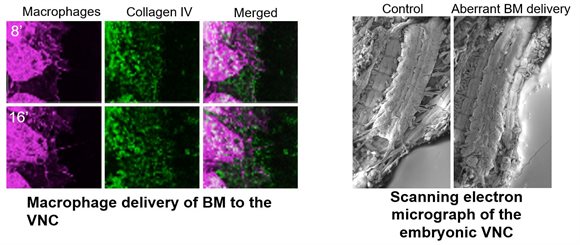
We are always open to collaborations. Please see the 'Our Research' tab for details of our research interests. Below are examples of collaborations and resulting publications and grants that have arisen from the network.
Examples of collaborative papers:
EPG5-related Vici syndrome: A paradigm of neurodevelopmental disorders with defective autophagy. Byrne, S., Jansen, L., U-King-im, J. M., Siddiqui, A., Lidov, H. G. W., Bodi, I., Smith, L., Mein, R., Cullup, T., Dionisi-Vici, C., Al-Gazali, L., Al-Owain, M., Bruwer, Z., Al Thihli, K., El-Garhy, R., Flanigan, K. M., Manickam, K., Zmuda, E., Banks, W., Gershoni-Baruch, R., & 34 others, 1 Mar 2016, In: Brain. 139, 3, p. 765-781.
The mTOR pathway component Unkempt regulates neural stem cell and neural progenitor cell cycle in the Drosophila central nervous system. Maierbrugger, K. T., Sousa-Nunes, R. & Bateman, J. M., 1 May 2020, In: Developmental Biology. 461, 1, p. 55-65.
Mitochondrial stress causes neuronal dysfunction via an ATF4-dependent increase in L-2-hydroxyglutarate. Hunt, R. J., Granat, L., McElroy, G., Ranganathan, R., Chandel, N. & Bateman, J. M., 2019, J Cell Biol. 218(12):4007-4016.
A feedback loop between dipeptide-repeat protein, TDP-43 and karyopherin-α mediates C9orf72-related neurodegeneration. Solomon, D. A., Stepto, A., Au, W. H., Adachi, Y., Diaper, D. C., Hall, R., Rekhi, A., Boudi, A., Tziortzouda, P., Lee, Y. B., Smith, B., Bridi, J. C., Spinelli, G., Dearlove, J., Humphrey, D. M., Gallo, J. M., Troakes, C., Fanto, M., Soller, M., Rogelj, B., & 4 others, 1 Oct 2018, In: Brain. 141, 10, p. 2908-2924.
In vivo expansion of functionally integrated GABAergic interneurons by targeted increase in neural progenitors. Shaw, R. E., Kottler, B., Ludlow, Z. N., Buhl, E., Kim, D., Morais da Silva, S., Miedzik, A., Coum, A., Hodge, J. JL., Hirth, F. & Sousa-Nunes, R., 2 Jul2018, In: The EMBO journal. 37, 13, p. 1-16 , e98163.
Decreasing pdzd8-mediated mito-ER contacts improves organismal fitness and mitigates Aβ42 toxicity Hewitt, V. L., Miller-Fleming, L., Twyning, M. J., Andreazza, S., Mattedi, F., Prudent, J., Polleux, F., Vagnoni, A. & Whitworth, A. J., 1 Nov 2022, In: Life Science Alliance. 5, 11, e202201531.
Kinesin light chain-1 serine-460 phosphorylation is altered in Alzheimer's disease and regulates axonal transport and processing of the amyloid precursor protein Mórotz, G. M., Glennon, E. B., Greig, J., Lau, D. H. W., Bhembre, N., Mattedi, F., Muschalik, N., Noble, W., Vagnoni, A. & Miller, C. C. J., 5 Dec 2019, In: Acta Neuropathologica Communications. 7, 1, , 200.
Examples of collaborative grants:
A Drosophila model for an Annexin gene causing ALS, Motor Neurone Disease Association, Fanto, M., Shaw, C., Smith, B., £125,421.20, 1/09/2017 → 31/12/2020
Dissecting the mechanisms of pathogenesis of TBK1 mutations using ALS Drosophila models, Academy of Medical Sciences, Kinghorn, K., Fanto, M., Shaw, C., £27,200.00, 6/08/2016 → 5/05/2019
A translational approach to neurodevelopmental disorders associated with defective autophagy., Action Medical Research, Jungbluth, H., Fanto, M., £197,474.00, 1/03/2016 → 31/08/2022
Role of Rbfox1 in development of osteoarthritis pain: advancing mechanistic studies towards better-quality drug discovery, Versus Arthritis, Baron, O., Denk, F., McMahon, S., £88,268.00, 1/05/2020 → 11/03/2023.
Drosophila model for muscular pain, NC3Rs National Centre for the Replacement, Refinement and Reduction of Animals in Research, Baron, O., Bateman, J., McMahon, S., £268,127.00, 1/11/2018 → 31/10/2022
Investigating polyamines as a treatment target for mitochondrial disease, MRC Medical Research Council, Bateman, J., Fernandes, C., £559,125.48, 1/06/2021 → 31/05/2024